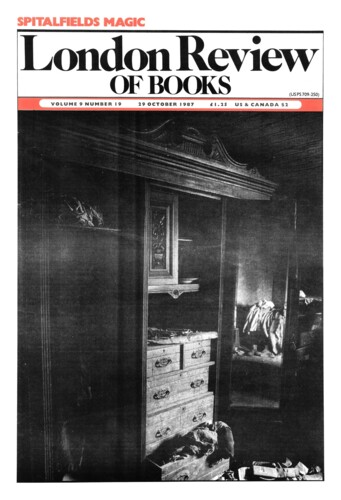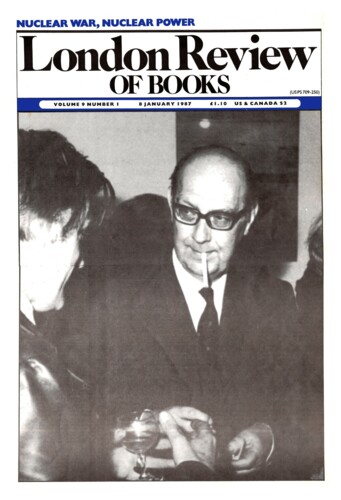Wormwood
Walter Patterson, 29 October 1987
Is the Chernobyl doorstop on its way? Surely it must be. I refer to the 1200-page, three-kilogram blockbuster which looms at you from airport bookstalls all over the reading world. Imagine the blurb: ‘Chernobyl – searing epic drama, torn from the headlines! Chernobyl – men and women against the ultimate force of nature – and against themselves! Chernobyl – high heroism, base cowardice, the clash of nations, the poignancy of personal tragedy. Chernobyl – East and West in confrontation, a technology facing its ultimate nightmare, a political system in upheaval.’ The author, however, faces a daunting task. His novel must encompass, among other themes, the evolution of nuclear technology since the Thirties, both for weapons and for electricity, East and West; the current status and prospects for nuclear power around the world – its technical, economic, social and political implications, before and after Chernobyl; the political history of the Soviet Union, its internal structure and its relationships with the world outside its borders; the role of nuclear technology in Soviet and other political contexts; the safety of nuclear technology, East and West; the control of hazardous technical developments; the medical and environmental effects of radioactivity; the international administration of nuclear affairs; nuclear planning and decision-making, East and West; the nature and availability of information about nuclear activities, East and West; and the moral dimensions of all these convoluted topics. The author of such a work will also have to write about the people involved. To list the dramatis personae is to demonstrate the scope of the tale he will have to unfold. You have the station staff of Chernobyl 4, preparing and carrying out an experiment that will destroy their plant, devastate the surroundings and leave many of them dead or dying. You have their families and neighbours in Pripyat, Chernobyl and the other towns and villages near the nuclear plant: summarily uprooted from their homes and despatched thousands of kilometres, in a mass evacuation from which many will never return. You have the firemen, the helicopter crews and the miners who fought to bring the shattered reactor under control. You have the local functionaries who kept the truth from their people; the Party politicos from Moscow who rushed to the scene; the academicians and engineers who planned the desperate counter-measures; the administrators who organised the evacuation and relocation of 135,000 people; the medics in Kiev and Moscow Hospital 6 who attended the injured and irradiated; and Dr Robert Gale, the American surgeon who joined them. You have Mikhail Gorbachev, the charismatic, controversial Soviet leader, castigated for remaining silent from 26 April to 14 May, who nevertheless seized on the Chernobyl accident to add powerful impetus to his campaign of glasnost. You have the Soviet media people, initially so anodyne with their broadcasts of May Day parades, who nevertheless eventually made and transmitted the stunning 80-minute documentary Warning, which was unlike anything ever shown on Soviet television. One Soviet film director spent so much time at the site that he became the 32nd fatality, dying of radiation injuries early this year. And then you have Vladimir Gubaryev, science editor of Pravda. The first reporter on the scene at Chernobyl, Gubaryev filed a series of pieces that appeared in Pravda. But he was so moved and incensed by the accident that he could not adequately convey his feelings in reportage, and, in July 1986, he wrote a play entitled Sarcophagus.


